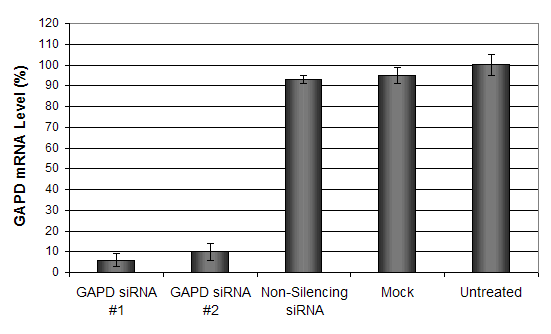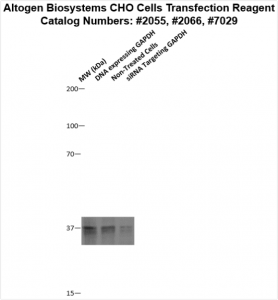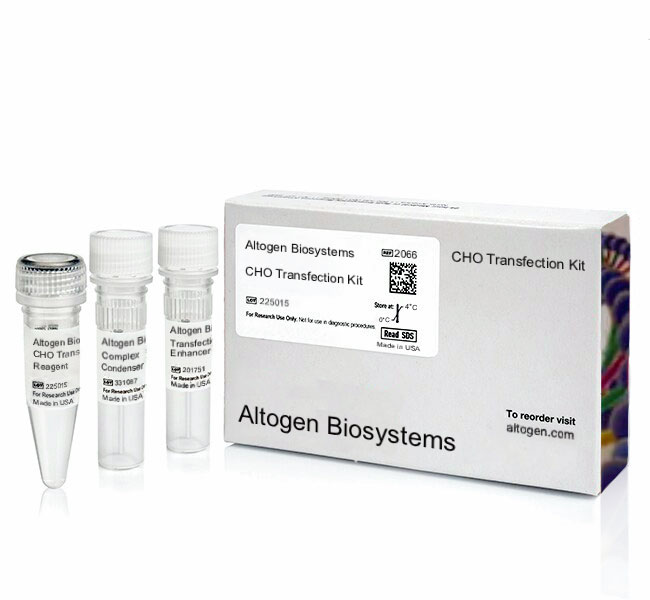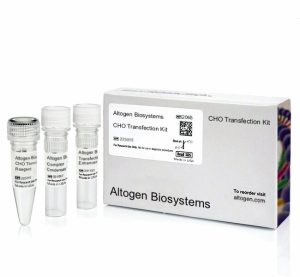Description
Purchase Orders: Click “Add to Cart” button to order, then email PO to orders@altogen.com.
Product Availability: In Stock.
Transfection Reagent for CHO Cells (Chinese hamster ovary cells, CCL-61)
-
Two component formulation enhances lipid mediated transfection efficiency
-
Optimized easy-to-use transfection protocol provided for transfection of siRNA, DNA, mRNA, and microRNA
-
Kit includes Transfection Enhancer reagent and recommended transfection protocol
- Kit includes Complex Condenser reagent and recommended transfection protocol
-
High transfection efficacy in the presence of serum
-
Expand your RNAi application with a reagent optimized for delivery of both siRNA and plasmid
-
Download in vitro CHO transfection protocol: [PDF]
- Download CHO CRISPR/Cas9 transfection protocol: [PDF]
-
Download PowerPoint presentation for CHO cells transfection kit: [PPT]
- UPC/GTIN/EAN: 860002089745
-
Brand: ALTOGEN®, developed and manufactured by Altogen Biosystems
Transfection Efficiency:
Reagent exhibits at least 90% transfection efficiency of siRNA delivery. Transfection efficiency was determined by qRT-PCR.
Product Description:
Advanced formulation of CHO transfection reagent and optimized transfection protocols provide efficient intracellular delivery of proteins, DNA, mRNA, shRNA, siRNA, and other negatively charged biomolecules.
Transfection Protocol and SDS:
Download Altogen Biosystems Transfection Protocol: [PDF]
Download SDS: [PDF]
CHO Cell Line:
Production of recombinant protein therapeutics is considered one of the most innovative biotechnological advances and can be highly effective for treatment of many diseases and conditions, including cancers, genetic and autoimmune disorders, and infectious diseases. Various non-human mammalian cell lines are generally used for the production of therapeutic proteins, with Chinese hamster ovary (CHO) cell line being the most important because of its ability to perform human-like protein folding. The Chinese Hamster Ovary (CHO) tissue cell line was first established in 1957 using Chinese Hamster (Cricetulus griseus) ovary cells and is one of the most well-used cell lines for clinical research, and for the synthesis of therapeutic proteins. Also, this mammalian cell line is highly utilized in transfection as well as in large-scale recombinant protein production. CHO cells exhibit an epithelial-like cell morphology and are extensively employed in biomedical research and biotechnology R&D applications. Altogen Biosystems offers the lipid-mediated CHO transfection reagent kit for Chinese hamster ovary cells that yields nearly 90% transfection efficiency.
The CHO (Chinese Hamster Ovary) cell line is a cell line derived from the ovary of the Chinese hamster. It is a popular cell line used in biotechnology and biomedical research for the production of recombinant proteins and therapeutic proteins such as monoclonal antibodies. CHO cells have several advantages as a host cell for the production of recombinant proteins. They are able to correctly fold and process complex proteins, and they are able to perform post-translational modifications such as glycosylation. CHO cells also have a high growth rate, are able to grow in suspension culture, and are adaptable to various serum-free media. The CHO cell line has become a workhorse for the biopharmaceutical industry, producing a large percentage of the world’s therapeutic proteins. Researchers also use CHO cells to study fundamental biological processes, such as protein synthesis, secretion, and processing, as well as to develop new methods for protein production and purification.
Data:

Figure 1. GAPD mRNA levels were quantified using real-time qRT-PCR in the CHO cells transfected with siRNAs targeting GAPD or non-silencing siRNA. Forty-eight hours post-transfection, the cells were harvested and analyzed by real-time qRT-PCR for GAPDH mRNA expression levels. Data were normalized against the 18S rRNA signal. Control samples were either mock-transfected or untreated. Values are normalized to untreated sample. Data are means ± SD (n=3).

Figure 2. Protein expression of GAPDH in CHO cells. DNA plasmid expressing GAPDH or siRNA targeting GAPDH were transfected into CHO cells following Altogen Biosystems transfection protocol. At 72 hours post-transfection the cells were analyzed by Western Blot for protein expression levels (normalized by total protein, 10 µg of total protein loaded per each well). Untreated cells used as a negative control.
Selected in vivo transfection product citations (ALTOGEN® IN VIVO Transfection Kits used in the following publications):
- Nature. 2008 454(7203):523-7. Innate immunity induced by composition-dependent RIG-I …Saito et al [PDF]
- Am J Pathology. 2010 177(4):1870-80. Role of ocular complement factor H in a murine model … Lyzogubov et al [PDF]
- Nature Biotechnology. 2011 29(4):341-5. Delivery of siRNA to the mouse brain by … Alvarez-Erviti et al [PDF]
- Gastroenterology. 2011 141(2) Differential type I interferon-mediated autophagic trafficking … Desai et al [PDF]
- PLoS Pathog. 2014 10(10) Exosomes from hepatitis C infected patients transmit HCV … Bukong et al [PDF]
Altogen Biosystems transfection and electroporation products for life sciences and cancer research. Transfection reagents are developed for individual cancer cell line and transfection protocols are optimized for maximum delivery efficiency. Advanced formulation of reagents and optimized transfection protocols provide efficient intracellular delivery of proteins, DNA, mRNA, shRNA, siRNA, and other negatively charged biomolecules in vitro and in vivo. Read more about transfection technology at Altogen’s Transfection Resource. Altogen Labs provides good laboratory practice (GLP) compliant preclinical research services for IND applications and drug development. Our biology CRO services includes both efficacy studies (over 90 in-house validated xenograft models) and safety pharmacology/toxicology studies.
Volume Options:
- 0.5 ml (Catalog #2055)
- 1.5 ml (Catalog #2066)
- 1.5 ml CRISPR (Catalog #2128)
- 8.0 ml (Catalog #7029)
Purchase Orders: Click “Add to Cart” button to order, then email PO to orders@altogen.com.
Product Availability: In Stock.






